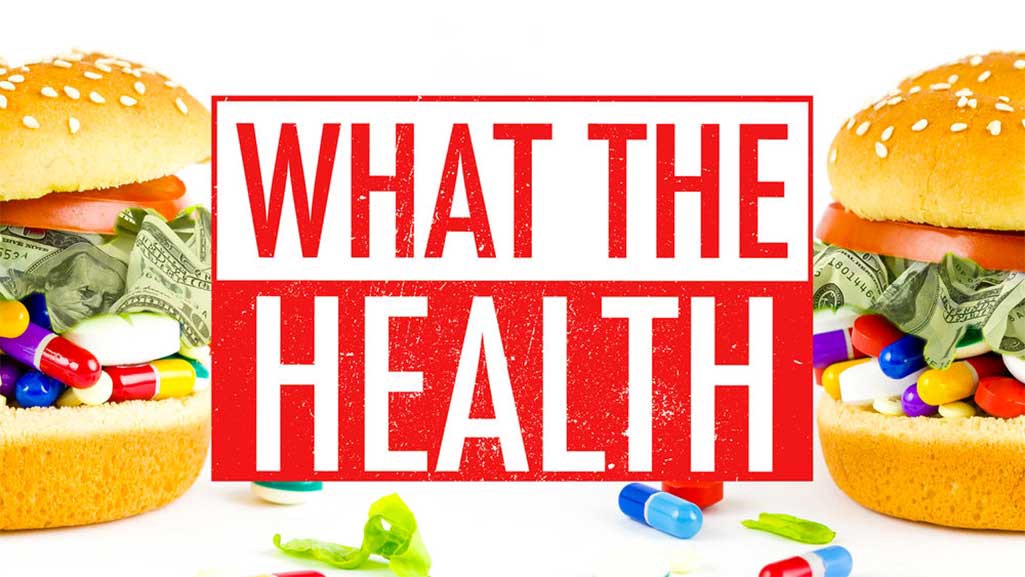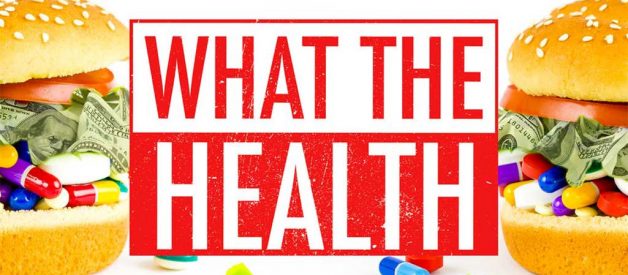
The documentary What the Health is receiving a huge amount of attention and most of it is positive. Many reports of people attempting to eat better are filling social media. I discussed the film on a local TV station in Detroit after two reporters indicated that the movie had made a big impact on their diets. There have even been reports that restaurants serving healthier fare have seen an uptick in customers attributing the change to the film. I have seen this in my own plant-based restaurant and have a What The Health Happy Hour that has been very popular.
Naturally, there have been critics of the movie defending their viewpoint that meat based diets are healthy, but most have rallied around a statement in the film by Neal Barnard, MD that ?sugar does not cause diabetes?. As the answer to this question may be important to you, I have done some research and share it here but this is in NO way an endorsement to add back soda and candy bars to your diet. In a world stressed by growing obesity and its medical consequences, limiting sugar is a universal recommendation from all health experts.
1) Type 1 diabetes is not caused by sugar. All agree on this as type 1 diabetes is considered an autoimmune disease leading to destruction of the insulin producing cells in the pancreas. However, patients with type 1 diabetes can develop and reverse insulin resistance (IR) in their muscles and liver so understanding the origin of IR is important.
2) Who is Neal Barnard, MD? Dr. Barnard is a graduate of the George Washington University School of Medicine and an adjunct associate professor of medicine there. He has published over 70 scientific publications (including long term studies on diet and diabetes) and 18 books including several New York Times bestsellers on health and diabetes. He is also a fellow of the American College of Cardiology.
2) Do other organizations agree that sugar does not cause type 2 diabetes? Actually, the opinion that sugar in the diet does not cause type 2 diabetes is a common viewpoint. The Joslin Diabetes Center calls it a ?myth? that sugar causes diabetes. Similarly, the British diabetes organization also maintains it is a myth that sugar causes diabetes. Finally, the American Diabetes Association lists the sugar=type 2 diabetes a myth but goes on to say that ?type 2 diabetes is caused by genetics and lifestyle factors. Being overweight does increase your risk for developing type 2 diabetes, and a diet high in calories from any source contributes to weight gain. Research has shown that drinking sugary drinks is linked to type 2 diabetes. The American Diabetes Association recommends that people should avoid intake of sugar-sweetened beverages to help prevent diabetes?. An association between sodas and the risk of type 2 diabetes has been seen in studies. Overall, Dr. Barnard and What the Health seem to be in good company in terms of the statement made about sugar.
3) Fat-rich diets raise blood sugar more than sugar-rich diets. Nearly 100 years ago healthy volunteers were fed diets rich in fat or carbohydrate and their blood sugars were monitored. The results showed blood sugar skyrocketed after that fat rich meals to twice as high a level. At a cellular level, elegant studies show that accumulation of fat droplets and not carbohydrate stores in liver and muscle cells contributes to IR and type 2 diabetes. These droplets result from raising levels of fats in the blood from animal fats like chicken, beef, cheese and fish and even vegetable fats in excess. Of course, most processed foods have too much sugar and fats so they are double trouble.
4) Dietary carbohydrates are not associated with developing type 2 diabetes. In a type of study called a case-cohort a careful analysis failed to find any correlation between types of dietary carbohydrates and the risk of developing type 2 diabetes. Admittedly, this is just one major study but the obvious is not so obvious.
5) Fruit Intake May Be Protective. In a recent and massive study of over 500,000 subjects followed over 7 years, the more frequently those studied ate fruit, the lower was their risk of developing type 2 diabetes. The lead researcher indicated wisely that ?the sugar in fruit is not the same as the sugar in manufactured foods?.
6) Can high-carbohydrate diets reverse type 2 diabetes? For over 85 years, researchers have identified benefits when switching patients with diabetes from low to high carbohydrate diets. In some of the most bizarre but effective of programs, Dr. Walter Kempner treated patients with type 2 diabetes and vascular disease with white rice, fruit juice, fruits and white sugar creating a no cholesterol and no-salt program of pure carbohydrates. He demonstrated reversal of malignant hypertension, diabetes, and kidney failure. Although I would not advocate this diet called the Duke Rice Diet, it was used effectively for decades to treat thousands of persons including many celebrities.
So did What the Health and Dr. Neal Barnard get it right? I think they did. However, Dr. Barnard and the filmmakers never suggested that you go back to swigging down sodas and sugar cubes and I don?t either. When I spoke to Cyrus Khambatta, Ph.D, a nutritional biochemist and type 1 diabetic, he suggested slight nuances might have been better accepted by critics such as ?type 2 diabetes is more easily caused by high fat intake than high sugar intake?. Or that ?a whole carbohydrate (fruits and vegetables) diet is safe to eat without increased risk of diabetes?. When I spoke to Gerald Shulman, MD of the Yale University School of Medicine and an internationally acclaimed expert on the origins of diabetes, his input was that ?it is not so much dietary content as it is calorie excess. Processed foods are calorie dense and low in satiety leading to overeating and excess calories and weight?. Indeed, the donut, present at almost all medical conferences, represents the perfect storm of refined grains and sugar with abundant fats from oils or lard. Consumption of such foods will raise the risk of obesity and type 2 diabetes and must be avoided.
As is so often the case, author Michael Pollan deserves credit for the simplest of messages to follow in teaching that ?eat food, not too much, mostly plants?. Alternatively, the pledge of the True Health Initiative, of which I am a member and which comprises a large group of diverse health experts, agrees that a diet comprised mostly of ?minimally processed, generally plant-predominant foods in time-honored, balanced combinations? with water as the preferred beverage is the dietary pattern for health promotion. Neither excess added sugar or fat are part of those dietary patterns. Less is more when it comes to sugars, processed foods, and added oils and fats.


